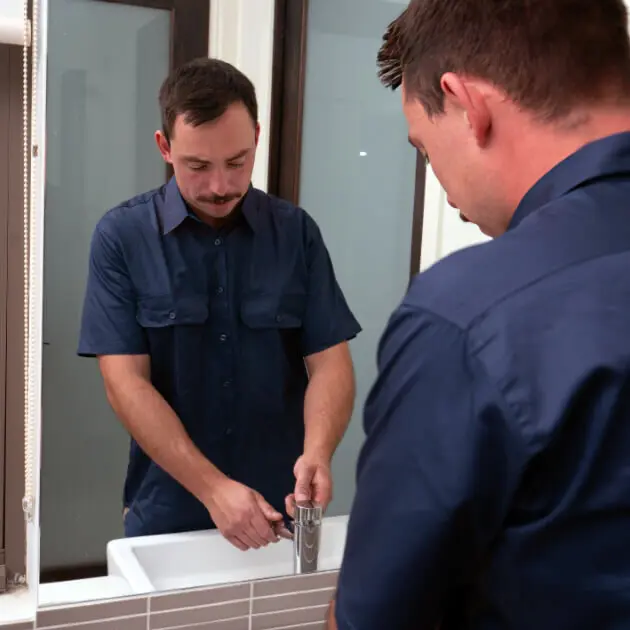First-Time Homeowners: Essential Advice for Your Bathroom Plumbing
First-Time Homeowners: Essential Advice for Your Bathroom Plumbing
Blog Article
What're your concepts on 6 Essential Plumbing Checks for New Homeowners?

For new property owners, understanding and preserving restroom plumbing can save both time and money by stopping expensive issues down the line. Here are some essential bathroom plumbing tips to aid you maintain everything running efficiently.
Plan For Winter
Secure your pipes from cold during winter by protecting pipes in unheated areas like basements, attics, and garages. Throughout severe chilly, allow cold water drip from taps offered by exposed pipes to aid avoid cold.
Arrange Regular Maintenance
Think about scheduling annual assessments with an accredited plumbing. They can identify concerns that you might miss, such as concealed leakages or damage on pipes and fixtures. Regular maintenance aids expand the life of your pipes system and can protect against emergencies.
Familiarize Yourself with the Key Shut-Off Valve
Knowing where the main water shut-off valve is located in your house is crucial. This allows you to swiftly switch off the water system in case of major leaks or throughout plumbing emergency situations, preventing substantial water damage.
Frequently Examine for Leakages
Tiny leakages can cause large issues. Routinely examine under sinks, around commodes, and near plumbing fixtures for any kind of indicators of leaks. Try to find moisture, small drips, or corrosion. Catching and fixing leakages early can stop much more serious damages and conserve water.
Maintain Your Water Heater
Guarantee your water heater is readied to an ideal temperature level (normally about 120 degrees Fahrenheit) to avoid hot and decrease power usage. Flush the storage tank each year to remove sediment buildup, which can minimize the performance and life-span of your heater.
Upgrade Your Fixtures
If your home has older components, think about upgrading to a lot more efficient models. Modern commodes, showerheads, and faucets are designed to use much less water while giving great pressure, which can dramatically reduce your water bill and ecological impact.
Be Cautious with Do It Yourself Plumbing Repairs
While it's alluring to manage all home repair work by yourself, be cautious with pipes. Some issues may require expert knowledge, specifically if they include major water lines or sewer repairs. Employing a specialist can sometimes be much more cost-efficient than DIY, especially if it avoids additional damages.
Do Not Overlook Slow Drains
If your sink or bathtub is draining slowly, it's usually an indicator of a clog creating. Resolving this early can avoid a total obstruction. Utilize a plunger or a plumbing's serpent to clear out debris. Stay clear of making use of chemical drainpipe cleansers as they can harm your pipes over time.
Know What Not to Flush
Commodes are not garbage disposals. Stay clear of flushing anything apart from bathroom tissue and human waste. Things like wipes, womanly health products, and cotton swabs ought to be disposed of in the garbage to avoid blockages and sewage system back-ups.
Set Up Strainers in Drains
Area strainers in your sink and bath tub drains to capture hair and other particles before they enter your plumbing system. Cleaning the filters on a regular basis will help avoid build-up and keep water flowing easily.
Conclusion
Understanding and preserving your home's shower room pipes can stop lots of usual concerns. By following these vital ideas, you can ensure your shower room stays functional and efficient, saving you time and money in the future.
Essential Plumbing Tips for Homeowners: Keep Your Pipes Flowing Smoothly
As a homeowner, understanding the basics of your plumbing system can save you time, money, and a lot of headaches. Plumbing issues can range from minor annoyances like dripping faucets to major problems like burst pipes that cause significant damage. This guide provides essential tips to help you maintain your plumbing system and tackle common issues.
Understanding Your Plumbing System
Supply System: Brings fresh water into your home from a municipal source or a well. Drain-Waste-Vent System: Removes wastewater and vents sewer gases outside. Fixtures and Appliances: Includes sinks, toilets, showers, dishwashers, and washing machines. Basic Maintenance Tips
Regular Inspections: Periodically check for leaks, corrosion, and other signs of wear and tear. Look under sinks, around toilets, and near water heaters. Know Your Main Shut-Off Valve: In case of a major leak, you’ll need to shut off the water quickly. Ensure everyone in your household knows where the main shut-off valve is located. Prevent Frozen Pipes: In cold climates, insulate exposed pipes and let faucets drip during extreme cold to prevent freezing. Use Strainers: Install strainers in sinks and tubs to catch hair, food particles, and other debris that can cause clogs. Common Plumbing Issues and Solutions
Clogged Drains:
Prevention: Avoid pouring grease down the drain and use drain screens to catch debris. DIY Fix: Use a plunger or a plumbing snake to clear minor clogs. For stubborn clogs, a mixture of baking soda and vinegar can sometimes help. Leaky Faucets:
Prevention: Replace washers and seals regularly. DIY Fix: Turn off the water supply, disassemble the faucet, and replace worn parts.

Call Today Report this page